On Film

THE WORD “SELFISH” is used many times throughout writer-director Laurel Parmet’s coming-of-age film The Starling Girl. Seventeen-year-old Jem Starling (Eliza Scanlen) hears it most often from her parents. Her father (Jimmi Simpson) uses the word to describe the period of his life before he got saved and gave up drinking. Her mother (Wrenn Schmidt) chides Jem for selfishness when she isn’t performing her duties at home. And at church, congregants direct the insult at Jem whenever her performance in the worship dance troupe pulls attention toward herself and away from God.
This understanding of “selfishness” dismisses the community members’ unmet needs. Jem, like most teenagers, is starting to consider what kind of person she’ll become. However, the only guidance she’s getting is from her fundamentalist church, which advises her to give up her dreams, fear her changing body, and let her church decide who she’ll marry. It’s no wonder that Jem’s thoughts turn increasingly to the only person who gives her positive, albeit problematic, attention: the youth leader, Owen Taylor (Lewis Pullman), the married son of her church’s pastor.
The Starling Girl is an empathetic portrait of the vulnerability and power of young women. It shows what can happen when the structures around them — family, church, patriarchy — limit that power and stifle their desires and dreams. This leads Jem to a sexual relationship with the similarly frustrated Owen, who’s drawn to Jem’s seemingly boundless potential.

HOW WOULD YOUR life change if you stopped filtering your thoughts and instead shared what was really on your mind? This is the question at the heart of Apple TV+’s Shrinking, a tear-jerker of a comedy that follows therapist Jimmy (Jason Segel) and his teen daughter Alice (Lukita Maxwell), who is grappling with the loss of her mom and the emotional withdrawal of her grieving dad. In the months following his wife’s unexpected death, Jimmy turns to women and substance use to numb his pain. As Jimmy checks out of actively parenting, other people in Alice’s community step in — including the neighbor Liz (Christa Miller), who makes dinner for Alice and cheers her on at the soccer games her dad has forgotten. After a particularly flagrant parenting fail on Jimmy’s part, Liz confronts him, saying, “I have to ask: Is this you forever?” Jimmy’s response is relatable to many who have lost themselves in the wake of losing a loved one: “I don’t know.”
Yet with assistance from Liz, candid conversations with co-therapist Gaby (Jessica Williams), and unwavering friendship from Brian (Michael Urie), viewers watch Jimmy return to himself. And in the process, he breaches all guidelines about boundaries between patients and clients.

IN HER POEM “Flare,” Mary Oliver writes about grief and the relationship between memory and reality, especially when it comes to parents. She writes: “My mother / was the blue wisteria, / my mother / was the mossy stream out behind the house, / my mother, alas, alas, / did not always love her life, / heavier than iron it was / as she carried it in her arms, from room to room.”
Our relationships with parents are shaped by our memories, what parents tell us about their lives, and what we come to understand about them. The Bible tells us to honor our father and mother, but we can never do that perfectly because we never fully know them. This becomes more poignant when those who raised us are no longer around.
Like Oliver’s poem, Joanna Hogg’s The Eternal Daughter (available on video on demand) captures this liminal, lonely feeling in an intensely personal way. Hogg’s semi-autobiographical film is a ghost story about memory, family, and the pull between the stories we know, the ones we don’t, and unresolved ways they differ.

THE OPENING SCENE of Holy Spider is brutal. We see a woman — a sex worker — leave her child at home to go to work. Walking through Iran’s holy city of Mashhad, she stops at a public restroom to adjust her headscarf and apply bold lipstick. She goes on her first call of the night and does some opium. As she prepares to go home, a man approaches on a motorcycle. He offers her money. She joins him. Shortly after arriving at their destination, he strangles her.
Writer-director Ali Abbasi’s Holy Spider is a fictionalized account of Saeed Hanaei, known as the Spider Killer, who targeted female sex workers in Mashhad from 2000 to 2001. The film, which premiered at the 2022 Cannes Film Festival, examines the killer’s life and the process of capturing him, led by (fictionalized) female journalist Arezoo Rahimi (Zar Amir Ebrahimi).
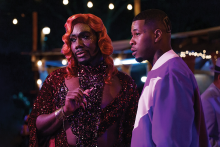
P-VALLEY IS A DRAMA about employees of a fictional strip club in Mississippi called The Pynk. Watching the show, which Starz has renewed for a third season, gives me déjà vu. In the opening minutes of the first episode, we see a neighborhood overtaken by a flood, the camera eventually focusing on a floating suitcase — which a woman who looks like she just survived a hurricane grabs. I’m reminded of Toni Morrison’s titular character Beloved, who “walked out of the water”; it’s all instantly reminiscent of the Southern, sin-filled aura of stories by Flannery O’Connor. A few minutes later, I’m hit with production design as colorful as that of the TV show Pose — unabashed theatricality.
This description should feel as dizzying as twirling around a stripper pole — that’s the inevitable impact of the artistic and spiritual heft P-Valley wields. The show, which is an adaptation of a play by Pulitzer Prize winner and Tony Award nominee Katori Hall, is about nothing less than free will. Hall explores complex topics such as sex work, abuse by men, abortion, and homophobia. Here in the Mississippi Delta, viewers get to know a mostly Black community trying to live as freely as the Constitution of their nation built by slaves declares white men should.
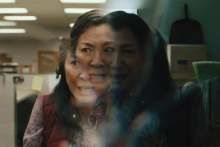
“THE SPIRITUAL LIFE, in other words, is not achieved by denying one part of life for the sake of another. The spiritual life is achieved only by listening to all of life and learning to respond to each of its dimensions wholly and with integrity.”
In this quote from Wisdom Distilled From the Daily: Living the Rule of St. Benedict Today, Joan Chittister writes about living a spiritually active existence that fully engages with our daily reality. She couldn’t have known it at the time, but Chittister might as well have been describing one of the biggest pop culture trends of the last few years: the multiverse.
The concept of multiple worlds and multiple versions of ourselves (some of whom live the life we secretly wish we had) has become ubiquitous across screens, from movies like Doctor Strange in the Multiverse of Madness and Spider-Man: No Way Home to TV shows like Rick and Morty and Doctor Who. Perhaps the example of multiverse storytelling to most successfully plumb emotional possibilities so far — listening to all of life and responding to its dimensions with integrity — is also one of 2022’s most surprising hits: the indie film Everything Everywhere All at Once.

THE BEST WORD to describe The Good Wife (2009-2016) in comparison to its prestige TV peers may be generous. Its predecessors (The Sopranos, The Wire, Mad Men, Breaking Bad) in the TV golden age of the early 2000s set the expectation that serious dramas on the small screen have seasons of about 13 episodes each and air on platforms you must pay for (cable channels such as HBO and AMC, and now subscription streaming services like Netflix). In contrast, less-than-highbrow thrillers with a bit of humor, like the police procedural NCIS, pour out nearly double that amount of content per season on free network TV.
But The Good Wife on CBS defied that expectation. Here was a network drama that was just as revelatory about humanity as the best of cable’s offerings while also being hilarious, accessible, and plentiful (seven seasons of no fewer than 22 episodes each). In a world where complex female TV protagonists are still too rare, revisiting The Good Wife is a holiday break well spent.

EMILY (AUBREY PLAZA) is caught in a vicious catch-22. She’s in deep student debt, but a criminal infraction keeps her from getting a job to pay down her balance. Emily’s stuck working catering gigs, and what little money she can set aside goes to her loan interest, practically ensuring she’ll never be able to get her head above water.
When a co-worker offers her a chance to make some extra cash, Emily jumps at the opportunity. It may be highly illegal, but what other choice does she have?
Writer/director John Patton Ford’s Emily the Criminal is a millennial version of classic gangster noir, with Plaza’s Emily drawn deeper into a criminal underworld where fast payout overrules ethics. Ford’s film never glamorizes Emily’s experiences, instead showing us a desperate person fed up with a world that gives her virtually no other choice but to break the law to survive.

WHEN REVIEWING FILMS, especially from a faith-based angle, it’s natural to look for concrete messages. Most mainstream films tell three-act stories, and those typically include a tidy resolution that presents a perspective or moral. But film is also an art form, and great art is more interested in creating atmosphere and asking questions than providing answers—not unlike faith, which teaches us to pose unanswerable questions and to sit with uncertainty.
For those who like tidy narratives, filmmaker Alex Garland’s work can be frustrating. Garland’s films are concerned with big concepts, many related to the characters’ desire for control at the expense of their humanity and others’ lives. However, his films rarely answer the questions they pose, leaving room for viewer interpretation. For audiences willing to engage with art that lives in an in-between place, this can be a thrilling, sometimes visceral, experience.
Garland’s latest film, Men, is his most tonally upsetting and his most abstruse. In it, Harper (Jessie Buckley) rents a country manor as a space to emotionally recover from the violent death—a possible suicide—of her husband, James (Paapa Essiedu). Her idyllic solitude is disrupted by a series of men (all played by Rory Kinnear) who threaten her emotionally, psychologically, and physically. The men appear in various forms, including a patronizing older man, a vulgar child, a manipulative vicar, a macho policeman, and a naked, silent stalker.
The concept itself is clear; Men is about the act of male intrusion on the lives of women. But it’s the way the movie communicates the theme that creates questions Garland would rather ask than answer.

MEILIN LEE, the 13-year-old hero of Pixar’s Turning Red, has a lot on her shoulders. She’s maintaining perfect grades alongside responsibilities helping her mom, Ming (Sandra Oh), run Toronto’s oldest Chinese temple. She’s torn between her identities as a dutiful daughter and a socially active teenager. Oh, and she transforms into a giant red panda in times of strong emotion.
That last issue, it turns out, is genetic. Because of a deal made by an ancestor, the women of Meilin’s family all poof into red pandas when they’re angry, sad, or excited, a trait that emerges during puberty. The panda spirit can be contained through a ritual. Ming is desperate to keep her daughter’s red panda spirit under control. Meilin, however, isn’t sure she wants it subdued.
Directed and co-written by Chinese Canadian animator Domee Shi, Turning Red’s fuzzy transfiguration is a metaphor for real-life stressors.

IN A 2001 lecture titled “Devotional Cinema,” filmmaker and film editor Nathaniel Dorsky broadly described devotional practice as “the interruption that allows us to experience what is hidden and to accept with our hearts our given situation.” Dorsky connected this definition to the experience of watching a movie, claiming, “It is alive as a devotional form,” allowing viewers to uncover truths about themselves and the world by watching someone else’s story. A movie doesn’t have to be experimental art, a heavy drama, or a religious epic to be a devotional experience. Often, the most profound stories are about the subtle changes of the soul over time and the experiences and relationships that define a person. We relate to them because, like a devotional practice, they help us reflect on our own lives and consider how we live in relation to others.
Joachim Trier’s The Worst Person in the World is one such film, following its protagonist, Julie (Renate Reinsve), from her late 20s to her early 30s. Trier places Julie as the main character of her own story, narrated to us as she lives it, changing careers, falling in love, breaking up, experiencing loss, and becoming wiser and more comfortable with herself as a result.

IN WHISTLING IN the Dark: A Doubter’s Dictionary, Frederick Buechner writes of the power of art, “If we are to love our neighbors, before doing anything else we must see our neighbors. With our imagination as well as our eyes ... like artists, we must see not just their faces but the life behind and within their faces.” All art can be a sacred space to share an artist’s experiences and needs. At its very best, it can generate empathy and healing.
In the new Netflix documentary Procession, filmmaker Robert Greene works with adult survivors of sexual abuse by Catholic priests, as well as trauma-trained advocates and therapists. The six men featured in the film collaboratively create dramatic scenes to process physical, emotional, and spiritual traumas. Their journey highlights the value of supportive communities, and the restorative potential of creative expression.
Though directed by Greene, Procession is credited as “a film by” everyone involved. Top billing goes to the men whose stories the film highlights: Joe Eldred, Mike Foreman, Ed Gavagan, Dan Laurine, Michael Sandridge, and Tom Viviano. While Greene may be the one behind the camera, ownership of the film belongs to the subjects.
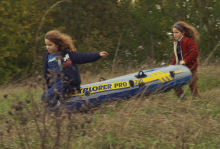
OVER THE LAST year we’ve had to reconsider our definition of what makes a “sacred space.” When churches and temples closed due to the pandemic, our homes became places of worship for many of us.
This cemented what’s always been true: Sacred space is a fluid thing. It can be a place of deep personal meaning or shared memories with people we care about. A sacred space doesn’t even need to be a physical location. It could also be the spiritual space created whenever we’re with those we love or remember people we’ve lost.
Céline Sciamma’s tender film Petite Maman speaks to this. A little girl, Nelly (Joséphine Sanz) and her mother, Marion (Nina Meurisse), grieve the death of Marion’s mother and clean out Marion’s childhood home. Sciamma’s movie becomes a meditation on everyday sacred spaces, including those that can exist within mother-daughter relationships.

NO MATTER YOUR racial, ethnic, spiritual, or geographic background, or where you fall on the gender spectrum, a vital part of adulthood is determining your identity—particularly in relationship to the community you grew up in. At some point, we all diverge from others’ opinions of us. Hopefully, we also find people who help us in our quest to define ourselves.
The Peacock series We Are Lady Parts, about an all-female, Muslim punk band, shows a group of characters who support each other on their individual journeys of identity, with their religion and larger community playing central roles. The series, created and written by Nida Manzoor, presents a diverse look at modern-day Muslim womanhood. Its themes also carry over into the broader experience of maturing alongside your faith, and what happens when your expression of belief conflicts with cultural expectations.
Lady Parts is fronted by the fierce feminist Saira (Sarah Kameela Impey). Earthy mom Bisma (Faith Omole) plays bass, and aggressive Ayesha (Juliette Motamed) is on drums. Momtaz (Lucie Shorthouse), often shown vaping through her niqab, is their manager. Saira decides the band needs a lead guitarist, eventually selecting Amina (Anjana Vasan), a painfully shy, tightly wound Ph.D. student.
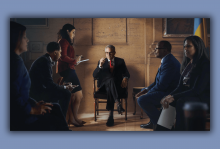
PENNSYLVANIA CAPTURED THE attention of many of us this year via the superb crime drama Mare of Easttown on HBO, but there’s another incredible television show set in the state that we should be watching. I’m talking about Philly D.A., on PBS. An eight-episode documentary series focused on activist-attorney Larry Krasner’s unusual election to the role of Philadelphia’s district attorney and his desire to drastically reform the office, Philly D.A. is gripping and revelatory in how it explores the intricacies of his efforts. In the social justice sphere, we have big ideas of how government systems and traditions can be altered and abandoned, but most of us never get the chance to implement them. Philly D.A. depicts a staff doing just that and shows how difficult it is.
We see assistant DAs and staff members who have worked in the office for years, for several administrations, and have households and families—we see them be fired because they’re believed to be too entrenched in how things were done in the past. We see surviving loved ones of murdered citizens wonder why, after many years of the DA’s office recommending the death penalty, Krasner does not see it as a good solution. We see judges and other officials express their fear that, in the pursuit of innovation, all aspects of a functioning system are being tampered with, negatively affecting the city’s safety.
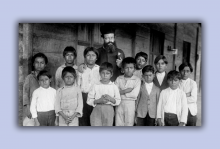
IN 2016, RAOUL PECK'S documentary I Am Not Your Negro used the life and work of James Baldwin to explore the underlying truths of racism in U.S. society. Peck said that after making that film, “Baldwin had firebombed every known field of bigotry I knew and annihilated any attempt at deniability of the racist monster that lurks in corners of our societies.”
Processing that experience led Peck to his new, ambitious HBO documentary series Exterminate All the Brutes. In it, Peck expands on the themes of ignorance and resistance in our modern-day understanding of racism and on how our flawed historical understanding feeds those attitudes. Exterminate All the Brutes is also an essay film, with Peck, a Haitian immigrant, reflecting on his identity as a Black man who has lived in a variety of cultures and how that’s influenced his own art.
The series weaves voiceover and scripted dramatic scenes with information from groundbreaking works on European colonialism, Indigenous peoples, and racism—including Roxanne Dunbar-Ortiz’s An Indigenous People’s History of the United States, Michel-Rolph Trouillot’s Silencing the Past, and Sven Lindqvist’s Exterminate All the Brutes.

THE PROPHET JOB had a hard life, but I think even he, if listening to Abby’s story, would say, “Damn.”
He’s not listening to her troubles, though: Abby’s therapist is. No, wait, she’s not listening either, for a reason that will spur Abby’s friends to joke about just how sad Abby’s life really is.
I’m describing Work in Progress, a scripted comedy produced by Showtime and co-written by Tim Mason, Lilly Wachowski (The Matrix, Sense 8), and Abby McEnany, who stars as a fictionalized version of herself.
“Abby is a mid-forties self-identified queer dyke whose life is a quiet and ongoing crisis,” Showtime’s website describes, not revealing that Abby lives with OCD, washing her hands repeatedly and recording her life meticulously in notebooks, in case she forgets anything she’s ever done. It doesn’t reveal that Abby, throughout much of her life, has been called Pat—a reference to the Saturday Night Live character from the early ’90s—and is often mistaken for a man, asked to leave public bathrooms, and struggles with her weight. It certainly doesn’t reveal what we learn in the first few minutes of Work in Progress: In a couple of weeks, if Abby’s life doesn’t get better, she plans to take her own life.
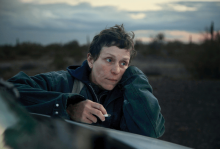
THE LAST CHAPTER of Hebrews in the New Testament begins with a reminder of how to serve God and build a healthy community: “Do not neglect to show hospitality to strangers, for by doing that some have entertained angels without knowing it” (13:2). Biblical hospitality takes many forms, but it consistently involves selfless sharing of space, resources, and—perhaps most importantly—attention. To share part of your life with another person, and allow them to share in return, is to show that they matter.
Nomadland, Chloé Zhao’s contemporary American road film, is full of biblical hospitality. By turning a documentary-style eye on a real community of nomads who otherwise slip through the cracks of society, writer and director Zhao’s film—which won 2021 Golden Globes for best motion picture and best director—provides its actors/subjects with space to be seen, heard, and known.
Like The Rider, Zhao’s previous film, Nomadland combines elements of narrative and documentary filmmaking by crafting a story around the lived experiences of real people. Our guide, Fern (Frances McDormand), leaves her home in Empire, Nev., to live on the road. Fern is part of a subculture of older adults who, left in dire financial straits by the 2008 recession, live in vans as modern-day nomads, picking up gig work across the country. As Fern travels, she makes friends with several fellow nomads (most of them real people playing themselves) who share their stories with her.

IN MIDDLE SCHOOL I emailed CBS and asked them to make a teen version of their reality show Big Brother, in the hope that they would cast me and I could schmooze and deceive my peers to win the contest’s $500,000 prize. Schmooze and deceive weren’t my bright ideas: They formed a strategy I had seen succeed on previous seasons of Big Brother and Survivor, as clueless heroes were undone by ruthless, money-hungry, victorious villains. Even CBS’ clean-fun competition The Amazing Race had enabled contestants to backstab another team for $1 million.
So it’s unexpected that the network’s newer prime-time contest Tough as Nails plays to kinder rules—and that it has become part of my mostly drama-filled viewing habits. Twelve Americans with some of the most strenuous jobs that exist (welder, farmer, firefighter, ironworker, and more) vie in team and individual challenges to see who’s the hardest and smartest worker. As an artsy guy whose most physically demanding professional activity is typing, I would not have pictured myself in the Tough as Nails fan base. And yet, here I am.

IN HIS BOOK Where God Happens: Discovering Christ in One Another, Rowan Williams writes, “We are easily persuaded that the problem of growing up in the life of the spirit can be located outside ourselves.” In other words, we like to think if only it weren’t for a health problem or professional situation, our lives would be better. If we put off becoming the person we are called to be because we’re waiting for the “right” circumstance, then we won’t learn and grow. Even when circumstances need to change, we must find joy in the present.
This same lesson powers Darius Marder’s drama Sound of Metal, about a drummer, Ruben (Riz Ahmed), who’s suddenly affected with permanent hearing loss. Ruben’s journey underlines the importance of presence and its potential to foster spiritual growth. He must learn that the situation he is in presents an opportunity to embrace a new community and a more intentional life.